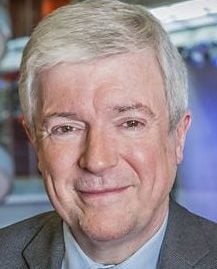
BBC director-general Tony Hall has stressed the importance of public service broadcasting being easily accessible to help people see “news and analysis they can trust”.
Hall co-hosted an event at Parliament yesterday with Channel 4 chief executive Alex Mahon to ask for updated legislation to ensure public service content can be easily found online and on-demand.
The pair are also working with ITV and Channel 5 to ensure their stories can be widely seen, Hall said.
During his speech, Hall said: “As the Secretary of State [Culture Secretary Matt Hancock] put it – the BBC is the nation’s ‘best bulwark against fake news’.
“We know that to be true and it’s a duty we take extremely seriously.”
He added: “In a world of fake news, disinformation and state propaganda this debate has to be about giving everyone access to impartial, trusted sources of news when they’re being bombarded with the opposite.
“We have a responsibility – all of us – to help people distinguish what’s a fact and what’s false but we can only do that if it’s simple and easy for people to choose our services.”
Hall added that this is an “important moment” for British broadcasting but said it is “under threat”.
“We’re asking all of you for your support to ensure that British voices, our content, creativity and ideas, continue to be easy to find,” he said.
“The current law is out of date. It needs to be looked at pretty fast.”
British broadcasters have proposed protecting the prominence of public service broadcasters on any device sold in the UK, including set top boxes, smart TVs and games consoles, and requested Ofcom looks afresh at its rules of prominence.
An Ofcom report into public service broadcasting in the digital age was published in March.
It said broadcasters will need to collaborate “to give themselves greater scale”, produce high quality programming and make it easily available on a wide range of platforms and devices in order to compete.
The call for change comes in the wake of the rapid growth in popularity of streaming platforms such as Netflix and Amazon Prime which are able to invest billions on original content.
“There’s a danger we are sleepwalking towards a world in which children and young people barely encounter public service broadcasting content,” said Hall.
He added: “Far from being anti-choice, this is about securing choice for UK audiences in the future: it’s about securing what Britain has to offer, as well as us enjoying big shows from the US.
“We’re also working with ITV and Channel 5, who care every bit as much as we do.”
Hall’s speech followed an announcement yesterday that the BBC, ITV, Channel 4 and network operator Arqiva will invest £125m over the next five years to improve and expand the range of platforms their content is available on.
The investment programme, fronted by Digital UK, will include the launch of a new Freeview Play app, which will show content from all British broadcasters, and voice search functionality on smart devices.
Jonathan Thompson, chief executive of Digital UK said: “As the UK’s TV landscape becomes increasingly impacted by global players, this new commitment from our shareholders is a major boost for UK viewers.
“Building on this spirit of collaboration, we will not only safeguard free-to-view TV but reinvent it for a new age of viewing.”
Picture: BBC
Email pged@pressgazette.co.uk to point out mistakes, provide story tips or send in a letter for publication on our "Letters Page" blog
